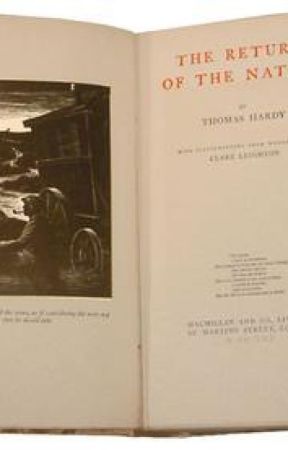When the whole Egdon concourse had left the site of the bonfire to its accustomed loneliness, a closely wrapped female figure approached the barrow from that quarter of the heath in which the little fire lay. Had the reddleman been watching he might have recognized her as the woman who had first stood there so singularly, and vanished at the approach of strangers. She ascended to her old position at the top, where the red coals of the perishing fire greeted her like living eyes in the corpse of day. There she stood still around her stretching the vast night atmosphere, whose incomplete darkness in comparison with the total darkness of the heath below it might have represented a venial beside a mortal sin.
That she was tall and straight in build, that she was lady-like in her movements, was all that could be learnt of her just now, her form being wrapped in a shawl folded in the old cornerwise fashion, and her head in a large kerchief, a protection not superfluous at this hour and place. Her back was towards the wind, which blew from the northwest; but whether she had avoided that aspect because of the chilly gusts which played about her exceptional position, or because her interest lay in the southeast, did not at first appear.
Her reason for standing so dead still as the pivot of this circle of heath-country was just as obscure. Her extraordinary fixity, her conspicuous loneliness, her heedlessness of night, betokened among other things an utter absence of fear. A tract of country unaltered from that sinister condition which made Caesar anxious every year to get clear of its glooms before the autumnal equinox, a kind of landscape and weather which leads travellers from the South to describe our island as Homer's Cimmerian land, was not, on the face of it, friendly to women.
It might reasonably have been supposed that she was listening to the wind, which rose somewhat as the night advanced, and laid hold of the attention. The wind, indeed, seemed made for the scene, as the scene seemed made for the hour. Part of its tone was quite special; what was heard there could be heard nowhere else. Gusts in innumerable series followed each other from the northwest, and when each one of them raced past the sound of its progress resolved into three. Treble, tenor, and bass notes were to be found therein. The general ricochet of the whole over pits and prominences had the gravest pitch of the chime. Next there could be heard the baritone buzz of a holly tree. Below these in force, above them in pitch, a dwindled voice strove hard at a husky tune, which was the peculiar local sound alluded to. Thinner and less immediately traceable than the other two, it was far more impressive than either. In it lay what may be called the linguistic peculiarity of the heath; and being audible nowhere on earth off a heath, it afforded a shadow of reason for the woman's tenseness, which continued as unbroken as ever.
Throughout the blowing of these plaintive November winds that note bore a great resemblance to the ruins of human song which remain to the throat of fourscore and ten. It was a worn whisper, dry and papery, and it brushed so distinctly across the ear that, by the accustomed, the material minutiae in which it originated could be realized as by touch. It was the united products of infinitesimal vegetable causes, and these were neither stems, leaves, fruit, blades, prickles, lichen, nor moss.
They were the mummied heathbells of the past summer, originally tender and purple, now washed colourless by Michaelmas rains, and dried to dead skins by October suns. So low was an individual sound from these that a combination of hundreds only just emerged from silence, and the myriads of the whole declivity reached the woman's ear but as a shrivelled and intermittent recitative. Yet scarcely a single accent among the many afloat tonight could have such power to impress a listener with thoughts of its origin. One inwardly saw the infinity of those combined multitudes; and perceived that each of the tiny trumpets was seized on entered, scoured and emerged from by the wind as thoroughly as if it were as vast as a crater.
"The spirit moved them." A meaning of the phrase forced itself upon the attention; and an emotional listener's fetichistic mood might have ended in one of more advanced quality. It was not, after all, that the left-hand expanse of old blooms spoke, or the right-hand, or those of the slope in front; but it was the single person of something else speaking through each at once.

YOU ARE READING
The Return of the Native (Completed)
ClassicsThe Return of the Native is Thomas Hardy's sixth published novel. It first appeared in the magazine Belgravia, a publication known for its sensationalism, and was presented in twelve monthly installments from January to December 1878. Because of the...
